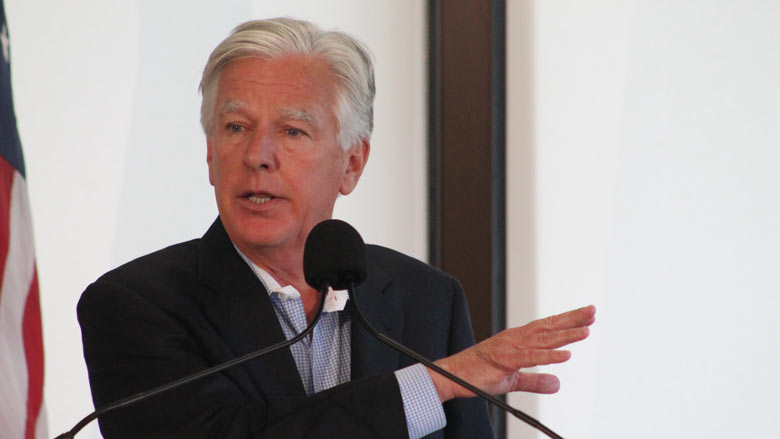UMass cybersecurity efforts get boost with state grant
By State House News Service | August 18, 2016, 6:54 EDT
 (SHNS photo)
(SHNS photo) SPRINGFIELD, MASS. — In the cybersecurity battles waged on servers and keyboards outside the public eye, Massachusetts is beefing up its bulkhead in Holyoke with a $5 million grant announced Wednesday that will be used to bolster computing technology used by the University of Massachusetts.
The internet, which is increasingly home to business, health and personal connections, is also rife with bad actors and state sponsored hackers.
“Cybersecurity has no boundaries. It is a global issue and a global fight in some respects,” Gov. Charlie Baker said Wednesday, as the grant was announced at the UMass Center in Springfield. He said, “The more information that becomes digitized, the more opportunity for mischief and chaos and disaster associated with cyberterrorism.”
Senate President Stan Rosenberg described an enlightening talk he heard by a cybersecurity official at the Federal Reserve Bank in February.
“He scared the bejesus out of us, because he described the vulnerability in our society in all aspects, including our banking, in our finances – in all of those things that we have come to rely upon,” Rosenberg said. He said the official told the crowd, “Everybody who’s focused on cybersecurity is looking at Massachusetts.”
The $5 million capital grant follows a $15 million, 10-year grant for operations that MassMutual gave UMass Amherst. Both awards are intended to fund big-data research in addition to cybersecurity.
UMass Amherst Chancellor Kumble Subbaswamy told the News Service the major computer equipment would be housed at the Massachusetts Green High Performance Computing Center in Holyoke.
The four-year Massachusetts Technology Collaborative grant is designed to create the UMass Amherst Data Science/Cybersecurity Research and Education Collaborative, and “computer nodes” will be distributed at UMass Amherst, Mount Holyoke College, the UMass Center in Springfield and UMass Boston, according to the Baker administration.
Brian Levine, director of the UMass Amherst Cybersecurity Institute, told the News Service there is “a lot of overlap” between big data and security. He said research at the institute analyzes the landscape of attacks on the internet.
“Every company basically has tremendous numbers of logs of these attacks that happen on an hourly basis to their companies, and they have questions,” Levine said. He said, “If you’re being bombarded every hour, you want to know, for instance, is this one campaign that someone targeted me, or am I getting random backscatter of various attacks that are just around?… It’s like you’re in a war zone and there’s random bullets coming at you, so that’s something to be concerned about, but it’s a lot different to be targeted.”
Roger Crandall, the chairman and CEO of Springfield-based insurer MassMutual, gave the crowd a window into the level of cyberattacks his company faces.
“Literally just the time we’ve been standing here there have probably been hundreds of thousands of attempted breaches of the MassMutual network,” Crandall said about 40 minutes into the speaking program. “And if you don’t keep the network safe and safeguard data, everything that we’re doing then falls apart. That’s table stakes. You have to do it.”
Cyberespionage has made headlines this summer.
In the past week websites run by a group called Shadow Brokers released what is reportedly secret code likely employed by the National Security Agency.
The release of valued online spying tools follows a hack against the Democratic National Committee and the release of internal emails this summer that upended the party’s leadership ahead of its convention in Philadelphia – an intrusion into politics blamed on Russian agents.
Some of the biggest criticisms against Democratic presidential nominee Hillary Clinton surround her unauthorized use of a home server to house secret diplomatic emails.
Levine said his institute’s resources aren’t geared toward investigating the leak of NSA code. Levine focuses on internet-based child exploitation, and he said colleagues look at online censorship.
Rep. Carlos Gonzalez, a Springfield Democrat, had some fun linking the recent news to the announcement.
“The Democratic Party would have loved to have this cybersecurity acknowledgment way before,” Gonzalez said. “And Hillary Clinton is waiting for this program to move fast along.”
— Written by Andy Metzger
Copyright State House News Service











